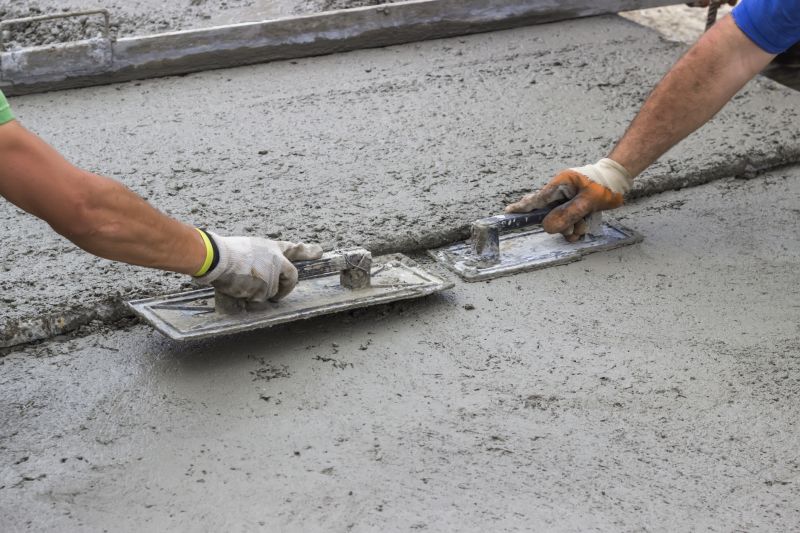Top-Rated Supplies For Efficient Concrete Installation Projects
Identify key products that help you complete concrete installations efficiently while maintaining quality and safety standards.
 Concrete installations are a fundamental aspect of many construction and renovation projects in Ashburn, VA. Whether you're pouring a new driveway, creating a sturdy foundation, or installing decorative concrete features, selecting the right products is essential for achieving durable and professional results. The process often involves multiple types of materials and tools designed to prepare, pour, and finish concrete effectively. From mixing and curing to finishing and sealing, each stage benefits from specialized products that ensure quality and longevity.
Concrete installations are a fundamental aspect of many construction and renovation projects in Ashburn, VA. Whether you're pouring a new driveway, creating a sturdy foundation, or installing decorative concrete features, selecting the right products is essential for achieving durable and professional results. The process often involves multiple types of materials and tools designed to prepare, pour, and finish concrete effectively. From mixing and curing to finishing and sealing, each stage benefits from specialized products that ensure quality and longevity.
Top Overall Option
Concrete Bonding and Admixture
A high-quality concrete bonding agent enhances adhesion between old and new concrete surfaces, promoting structural integrity. It is versatile and easy to apply, making it suitable for a range of projects from repairs to new pours. Proper use of bonding agents can help reduce cracking and improve overall durability.
Types of Products For Concrete Installations
Concrete Mixes
Pre-mixed or custom-blended concrete designed for various load-bearing and aesthetic applications.
Form Release Agents
Products used to prevent concrete from sticking to forms, ensuring clean and smooth finishes.
Concrete Sealers
Protective coatings that enhance surface durability and resistance to stains and weathering.
Reinforcement Materials
Includes rebar, wire mesh, and fiber reinforcements to improve concrete strength and crack resistance.
Concrete Vibrators
Tools used to eliminate air pockets and ensure proper compaction of poured concrete.
Curing Compounds
Sprays or coverings that retain moisture in concrete during the curing process, promoting proper hardening.
Expansion Joints
Materials that allow for movement within concrete slabs, reducing the risk of cracking.
Concrete Edgers and Groovers
Tools for creating smooth edges and control joints for aesthetic and structural purposes.
Surface Finishing Tools
Brooms, trowels, and floats used to achieve desired surface textures and smoothness.
Concrete Repair Products
Patch compounds and repair mortars designed to fix cracks and surface damage.
Concrete Dyes and Stains
Coloring agents used to add decorative effects to finished concrete surfaces.
Concrete Pumps
Equipment that facilitates the efficient placement of concrete in hard-to-reach areas.
Vibration Pads and Mats
Accessories that help distribute vibration evenly and reduce noise during compaction.
Form Boards and Frames
Reusable or disposable forms used to shape concrete during pouring.
Concrete Edging Tools
Specialized tools for creating decorative or functional edges on concrete surfaces.
Popular Choices
Available in various formulations suitable for different project requirements.
Widely used for protecting concrete surfaces from stains and weathering.
Commonly used to strengthen slabs and prevent cracking.
Popular for achieving clean, professional finishes on concrete forms.
Essential for maintaining moisture during curing, especially in dry conditions.
Frequently employed to ensure proper consolidation of poured concrete.
Important for large slabs to accommodate movement and temperature changes.
Brooms and floats are commonly used to achieve textured or smooth finishes.
Popular for fixing cracks and surface imperfections.
Dyes and stains are trending for decorative concrete projects.
Increasingly used for efficient placement in complex or large-scale projects.
Reusable forms are favored for their cost-effectiveness and consistency.
In recent years, advancements in concrete-related products have provided more options for both DIY enthusiasts and professional contractors. These include versatile bonding agents, high-performance sealers, and innovative tools that improve efficiency and finish quality. Proper selection of products can help prevent common issues such as cracking, uneven surfaces, and premature deterioration. It is also important to consider compatibility with existing materials, environmental conditions, and the specific requirements of each project.
Understanding the various product categories available can assist in making informed purchasing decisions. For example, choosing the right concrete mix can influence the strength and workability, while appropriate curing compounds can significantly impact the finished appearance and durability. Accessories like expansion joints, form release agents, and reinforcement materials further contribute to the overall success of concrete installations. Investing in quality products tailored to your project scope can lead to more consistent and satisfactory results.
In Ashburn, VA, the local climate and soil conditions may also influence product choices. Consulting with local suppliers or professionals can provide insights into the most suitable materials for your specific environment. Whether undertaking a small residential project or a large commercial build, understanding your options and selecting appropriate products can make the process smoother and more predictable.
Key Buying Considerations
- Compatibility with existing concrete or substrates
- Project scale and volume requirements
- Weather and environmental conditions during installation
- Desired finish and surface texture
- Strength and load-bearing specifications
- Ease of application and handling
- Durability and resistance to wear and weathering
- Curing and drying timeframes
- Reinforcement compatibility and requirements
- Budget constraints and cost-effectiveness
- Availability of replacement parts or accessories
- Local building codes and regulations
- Supplier reputation and product reviews
- Ease of maintenance and long-term care
- Environmental conditions like moisture and temperature fluctuations
